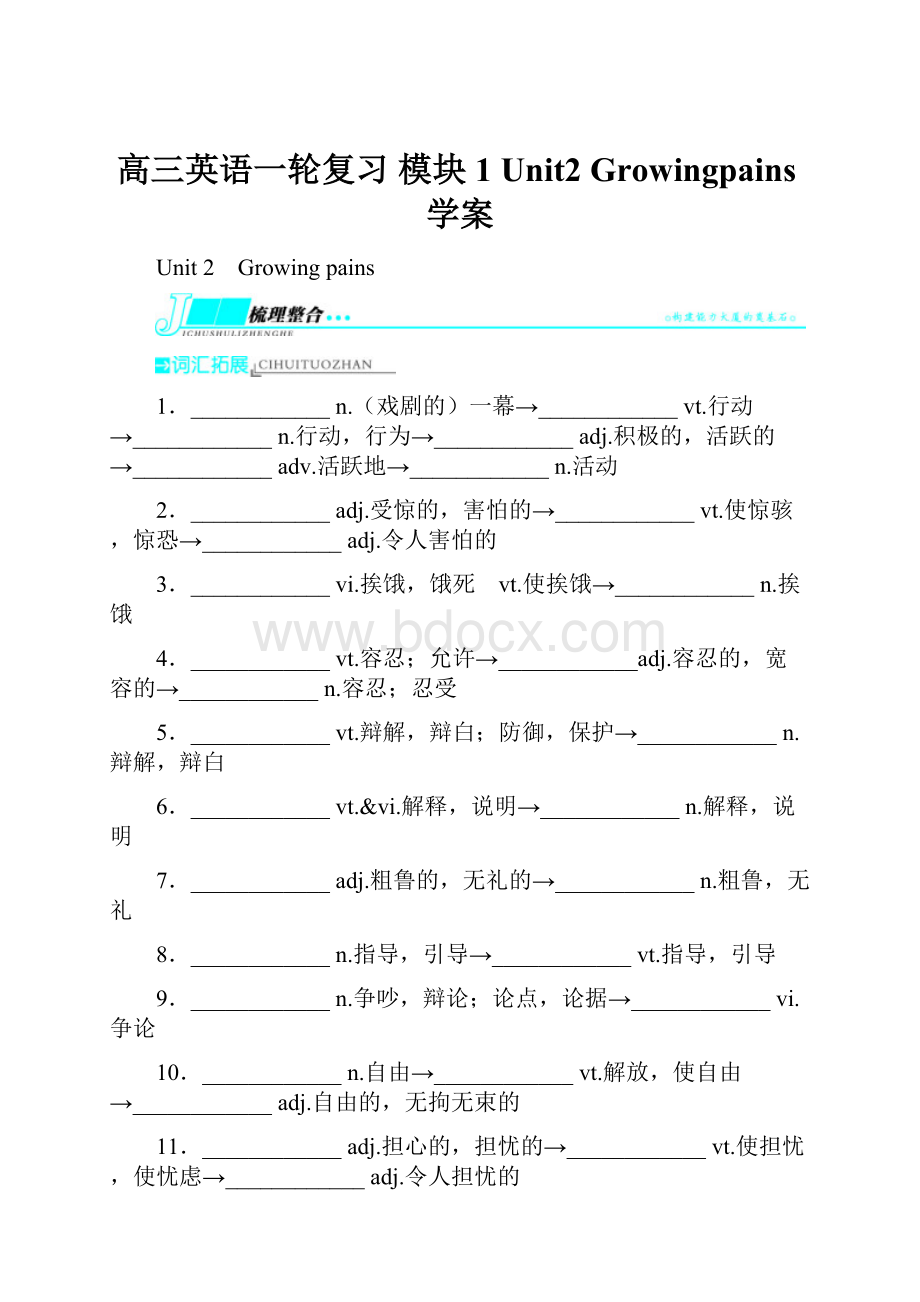高三英语一轮复习 模块1 Unit2 Growingpains学案.docx
《高三英语一轮复习 模块1 Unit2 Growingpains学案.docx》由会员分享,可在线阅读,更多相关《高三英语一轮复习 模块1 Unit2 Growingpains学案.docx(23页珍藏版)》请在冰豆网上搜索。

高三英语一轮复习模块1Unit2Growingpains学案
Unit2 Growingpains
1.____________n.(戏剧的)一幕→____________vt.行动→____________n.行动,行为→____________adj.积极的,活跃的→____________adv.活跃地→____________n.活动
2.____________adj.受惊的,害怕的→____________vt.使惊骇,惊恐→____________adj.令人害怕的
3.____________vi.挨饿,饿死 vt.使挨饿→____________n.挨饿
4.____________vt.容忍;允许→____________adj.容忍的,宽容的→____________n.容忍;忍受
5.____________vt.辩解,辩白;防御,保护→____________n.辩解,辩白
6.____________vt.&vi.解释,说明→____________n.解释,说明
7.____________adj.粗鲁的,无礼的→____________n.粗鲁,无礼
8.____________n.指导,引导→____________vt.指导,引导
9.____________n.争吵,辩论;论点,论据→____________vi.争论
10.____________n.自由→____________vt.解放,使自由→____________adj.自由的,无拘无束的
11.____________adj.担心的,担忧的→____________vt.使担忧,使忧虑→____________adj.令人担忧的
12.____________vt.&n.伤害→____________adj.有害的→____________adj.无害的
13.____________adj.愚蠢的→____________vt.&n.愚弄;傻瓜
14.____________n.耐心→____________adj.有耐心的→____________adv.有耐心地→____________adj.不耐烦的
15.____________adj.自私的→____________n.自己,自身→____________adj.无私的
16.____________n.&adj.正常(的),一般(的)→____________adv.正常地,一般地→____________adj.不正常的
17.____________adj.具有挑战性的→____________n.&vt.挑战
1.Theheavyrainbeatsohardagainstthewindowsasifsomeonewerehittingthem,andIwasverymuchf________.
2.MrObamamustmakeitclearthathewillnott________attemptstoparalyze(使停滞)hismedicalcarereform.
3.Changestotheregulardailyschedulecancauseyourchildto
feelu________andsad.
4.Theyneedmoretroopstod________theborderagainstpossibleattacks.
5.Thepatientd________tobeinformedaboutthepossiblesideeffectsofthedruginadvance.
6.He'dbetterhaveagood____________(解释)forhisbehaviour.
7.Willia
mstartedoffonthewrongfootbyhavingan_______
_____(争辩)withthemanageronhisfirstdayatwork.
8.Iamnot____________(担心的)aboutyourhealthbutyourmarriage.
9.Heoweshissuccesstohardworkand____________(耐心).
10.Youaresupposedtorealizethatyourfearsandanxietiesarea____________(正常的)partoftheprocess.
1.____________up把声音调大;出现
2.____________sb.todosth.强迫某人做某事
3.can't____________todosth.迫不及待地要做某事
4.look____________打量四周
5.be____________todo应该,应当做……
6.____________at对某人大喊
7.go____________(灯)熄灭
8.not...____________不再,再也不
9.____________of代替,而不是
10.be____________on对……苛刻,对……严厉
11.____________that既然;由于
12.feel____________感到不安
13.keep...in____________记住
14.grow____________sth.因长大而不再喜欢某事物或不再做某事
15.goto____________入睡
16.be____________of为……感到骄傲
17.____________up熬夜
18.____________all毕竟
19.as____________至于,关于
20.____________upwith赶上
21.get____________with与某人相处,进展
22.go____________经历
23.outof____________未被控制住,失控
24.____________on依赖
25.turn____________结果是,证明是
1.Ericrunsinafterit,followedbyabigdog,walkingveryslowly.
埃里克跟在后面跑了进来,后面跟着条大狗,这狗走得很慢。
句型提炼:
followedby...过去分词短语作伴随状语。
2.Theroomisinamess,withpizzaboxesontheflooranddirtydishesinthesink.
屋里一团糟,有比萨盒子在地板上,洗碗池里堆满了脏碟子。
句型提炼:
with+名词/代词+形容
词/副词/介词短语/不定式/分词,在句中可作定语或状语。
3.Listentome,youngman—weleftyouincharge!
年轻人,听我说,我们走的时候是把家交给你管了!
句型提炼:
leavesth./sb.+形容词/副词/介词短语/不定式/分词,表示“使……处于某种状态”。
形容词、副词、介词短语、不定式或分词在句中作宾语补足语。
4.Atpresent,topreventupsettinghismotherwithanargument,Iamallowinghimhisfreedom.
目前,为了避免争吵而引起他的妈妈不安,我放纵他的自由。
句型提炼:
toprevent...不定式作目的状语。
preventdoingsth.阻止做某事。
allowsb.sth.允许某人某事。
5.However,IamworriedthatifIkeepallowinghimtodowhathewants,hemayfailatschool,orworse.
可是,我担心如果我继续让他为所欲为的话,那他将学无所成,甚至更糟。
句型提炼:
IamworriedthatifIkeep...这里that引导的宾语从句里含有if引导的条件状语从句,that不可省略。
keepdoing...一直做……。
allowsb.todosth.允许某人做某事。
1.insistvt.&vi.坚持,主张;坚持说,坚持认为
1.表示“坚持”“主张”等,可作及物动词或不及物动词。
用作及物动词时,其后通常只接that从句作宾语,而不能接名词或代词作宾语,也不能接不定式或动名词作宾语。
但是若其后接有介词on或upon,则可后接名词、代词或动名词。
2.其后可接that从句,但要根据意思的不同而分清两种情况:
(1)表示“坚持要”“一定要”,从句所指的一般是尚未实现的事实,此时谓语通常用虚拟语气(即should+动词原形)。
(2)表示“坚持说”
“坚持认为”,从句所指的通常是已经发生的事或已存在的状态,谓语一般用陈述语气,引导词that可省
略。
①Sheinsistedonpayingforherfood.=Sheinsistedthatshe(should)payforherfood.她坚持要付她自己的那一份饭钱。
②Thedetectiveinsistedthatheshouldhavealook.警探坚持要查看。
③Johninsistedthatheheardsomebodyinthehouse.
约翰坚持说他听到房子里有人。
④Heinsistedthathewasnotill,butthedoctorinsistedthatheshouldtakethemedicine.
他坚持说他没有病,但医生却坚持要他服药。
反馈1.1Ourteacherinsistedthatthekeywordsworthpayingattention______beforeclass.
A.beunderlined
B.beingunderlined
C.tobeunderlined
D.tobeingunderlined
反馈1.2Themaninsisted______ataxiformeeventhoughItoldhimIlivednearby.
A.find B.tofind
C.onfindingD.infinding
反馈1.3Heinsistedthathe______right,andsoheinsistedthathisplan______carriedoutatonce.
A.was;beB.be;wouldbe
C.was;wasD.be;shouldbe
2.leavevt.离开(某处);遗弃,离弃;遗忘;丢下;听任,使处于某种状态;留给;把……交给;委托
①Thetrainwillleaveatsixtomorrowmorning.
火车明早六点出发。
②Whathesaidleftadeepimpressiononmymind.
他讲的话给我留下了深刻印象。
③Leaveherinpeace.不要打扰她。
④Ican'tleavesuchanimportantmatterundone/unfinished.
我不能让这样一件重要的事半途而废。
⑤Themovingstorylefthimunmoved.
他对这个令人感动的故事竟然无动于衷。
⑥Thismatterleftherwithoutawayofhope.
这件事使她没有一丝一毫的希望。
⑦I'llleavehiminchargeofthematter.我要把这件事交给他负责。
⑧Leavehimtodoithimself.让他自己做这件事吧。
注意:
left“剩下的”,一般作后置定语;remaining也可表示“剩余的”,它只能作前置定语。
反馈2.1—Whathasmadehimupsetrecently?
—______alonetofaceatroublesomemilkcase.
A.LeftB.Beingleft
C.HavingleftD.Toleave
反馈2.2SARSisanillnessthatcanresultindeathunless______intime.
A.totreatB.treating
C.treatedD.treat
反馈2.3Theladysaidshewouldbuyagiftforherdaughterwiththe______.
A.20dollarsremained
B.20dollarstoremain
C.remained20dollars
D.remaining20dollars
3.harmvt.&n.伤害
doharmtosb.=dosb.harm伤害某人
cometoharm(身体上或精神上)受到伤害
形容词harmful beharmfulto...对……有害
①Gettingupearlywon'tharmyou.早起对你没有害处。
②Itwouldn'tdoheranyharmtoworkabitharder.工作加点劲对她没有坏处。
易混辨析wound,injure,hurt,harm,damage,destroy,ruin
1)wound指用枪弹或刀剑等锐器故意施加的伤害。
在事故或天灾中受伤用injure或hurt。
wound与injure在肉体受伤的程度上往往比hurt严重。
2)hurt除指肉体的伤害外,也可指感情上的伤害,如hurtone'sfeeling,hurtone'spride。
hurt的过去分词作表语时有“苦恼的,伤心的”的含义。
作不及物动词时,有“疼痛”的含义。
3)injured和wounded可作表语,也可作定语,而hurt的过去分词只能作表语不能作定语。
4)harm和damage均指伤害或损害某人或某物。
harm主要用于有生命的东西,偶尔也用于无生命的事物,常指伤及健康、权利、实业等。
5)damage主要指对价值和功能的损坏,虽然也可用于有生命的东西,但是多用于无生命的东西。
6)destroy“毁坏”“消灭”,指通过某种有力的或粗暴的手段使之毁灭或无用。
7)ruin“毁掉,弄糟”,强调毁坏的彻底性。
①Hewasseriouslyinjured/hurtinatrafficaccident.
他在一次交通事故中严重受伤。
②Myfeelingswerehurtwhenhedidn'tinvitemetotheparty.
他没邀请我去参加晚会伤害了我的感情。
③Doctorssaysmokingharmsourhealth.医生说抽烟有害健康。
④Thestrongwinddamagedseveralhouses.大风摧毁了几栋房屋。
⑤Don'tdestroythatbox;itmaybeuseful.
别把那只箱子弄坏了,它或许还有用。
反馈3.1—Why,sheisabsentagain!
—Shewas______badlyinanaccident.
A.injuredB.harm
C.shockedD.beaten
反馈3.2Yearsoffightinghaveleftthevillagein______.
A.destroyB.damage
C.ruinsD.ruin
反馈3.3Thenewsmeantthe______ofallourhopes.
A.damageB.harm
C.ruinD.hurt
反馈3.4用wound,injure,hurt,harm,damage,destroy的适当形式填空:
1)Theyaskedhimtopayforthe______butherefused.
2)Beforetheyfledthecountry,theenemyattemptedto______allthefactories.
3)Johnny,youmustn'tplaywiththeknife;youmay______yourself.
4)Thesoldierreceivedaserious______onthechest.
5)He______hislefthandinafire.
6)Harmwatch,______catch.
4.normaln.&adj.正常(的),一般(的)
①Thecollapseofthestrikeenabledbusservicestobebacktonormal.
罢工的失败使公共汽车营运恢复了正常。
②Shebracedherselftoleadanormallife.她振作起来去过正常的生活。
易混辨析common,ordinary,general,normal,usual的区别
common强调“常见的,不足为奇的,共同的,公共的,公有的,普通的,庸俗的”。
ordinary(与众多同类的东西相比)强调“平常的,平淡无奇的”。
general意为“普遍的,一般的,普通的,综合的,概括的,全面的,大体的,大致的”。
normal指“正常的,正规的,常态的,一般的”。
usual指“平常的;通常的,惯常的”。
①Snowiscommonincoldcountries.在寒冷的国家雪是常见的。
②Theseareallstoriesaboutordinarypeople.这些都是些普通人的故事。
③Thisbookisintendedforthegeneralreaders,notforthespecialists.
这本书是为一般读者写的,不是为专家写的。
④Twelveo'clockistheusualtimetohavelunch.十二点通常是吃饭的时间。
反馈4.1WhenItookhistemperature,itwastwodegreesabove______.
A.usualB.ordinary
C.regularD.normal
反馈4.2Intoday'sworld,youngstersalwayshavemuch______,______theycomefrom.
A.ingeneral;wherever
B.incommon;wherever
C.ingeneral;where
D.incommon;where
反馈4.3Tobefrank,Ireallydon'tknowwhattheyhavein______,becausethey'resodifferentincharacter.
A.commonB.ordinary
C.usualD.regular
5.turnup将声音调大;出现,露面
①Hepromisedtocomebuthasn'tturnedupyet.
他答应来的,可是到现在都没出现。
②Ican'theartheradioverywell.Couldyouturnitupabit?
我听不清楚收音机。
你能把音量调大点吗?
用法拓展含有turn的短语
turnagainst背叛 turnround转过身
turnaway不理睬,撵走turnin上交
turnover翻开turnagainst背叛
turnback返回,翻回到turndown拒绝,把音量开小一点
turnon打开turnoff关掉
turninto把……变为byturns轮流
taketurns轮流turnout结果是,原来是
turnto转向,求助于
反馈5.1Ithasbeenrainingeverydaysofar.Ihopetomorrowwill______fine.
A.turntoB.turnup
C.turnintoD.turnout
反馈5.2She'shavingalotoftroublewiththenewcomputer,butshedoesn'tknowwhomto______.
A.turntoB.lookfor
C.dealwithD.talkabout
反馈5.3ForalltheseyearsIhavebeenworkingforothers.I'mhopingI'll______myownbusinesssomeday.
A.turnupB.fixup
C.setupD.makeup
6.goout出去;熄灭
①Johnmayphonetonight.Idon'twanttogooutincasehephones.
今晚约翰可能会打电话,我不想出去以防他打电话过来。
②Nobodynoticedthethiefslipintotheroombecausethelightshappenedtogooutatthemoment.
没有人注意到小偷溜进了这间房子,因为灯在那时正好灭了。
用法拓展
goafter追赶;想得到
goahead请便;往前走,前进
godown下降,下沉
goaway走开
goby时间流逝
gooff爆炸
gointo进入
goinfor爱好;参加
gotoofar过分
goup上升
goover审查;复习
gowithout没有……勉强凑合
gothrough经历,遭受,完成
gowrong出毛病
gosmooth进展顺利
反馈6.1—IwonderifIcouldpossiblyuseyourcomputerfortonight?
—______.I'mnotusingitanyhow.
A.Sure,goahead
B.Idon'tknow
C.Yes,inde